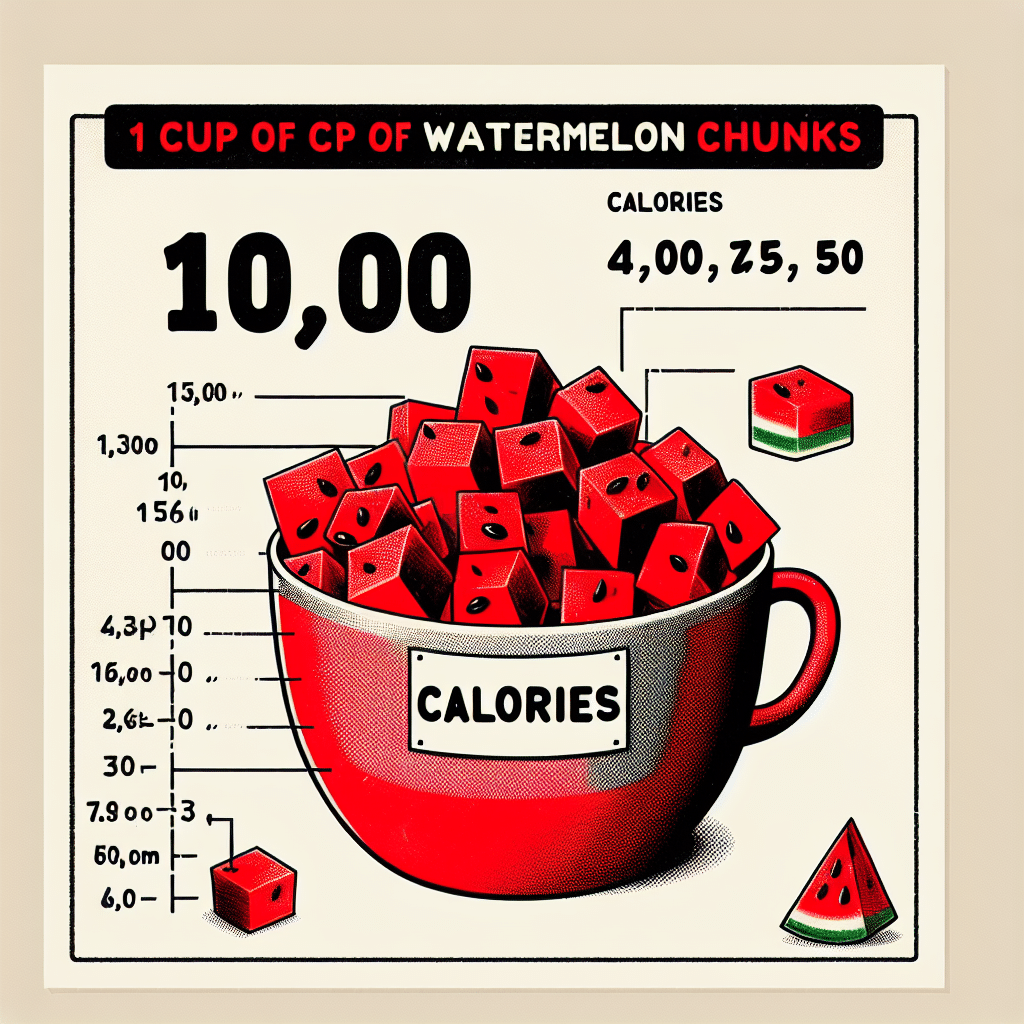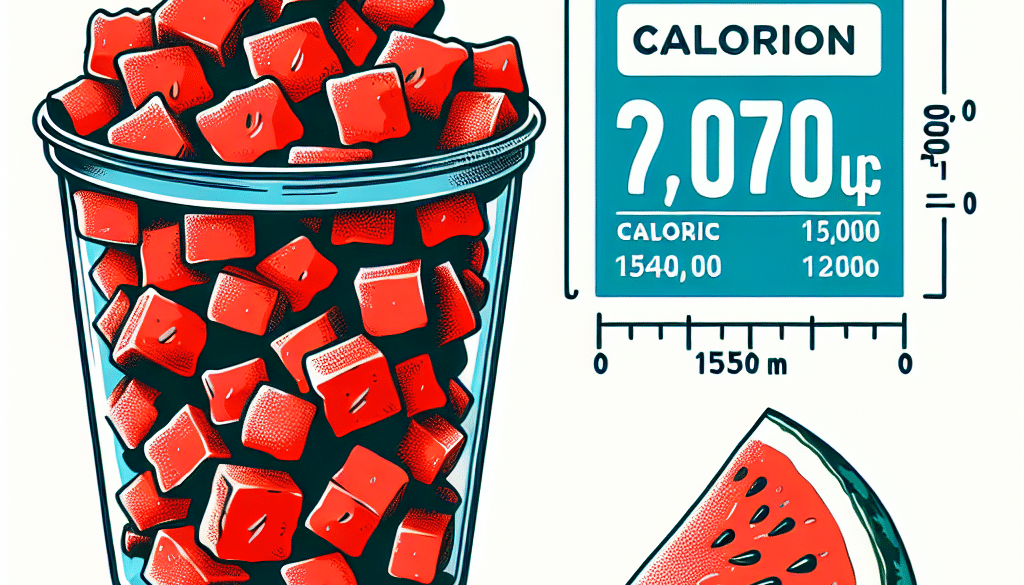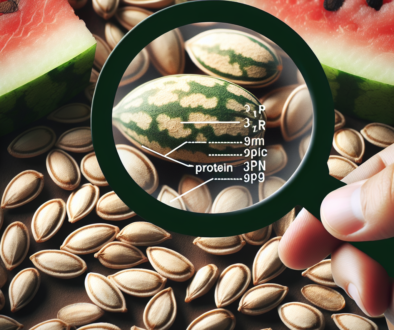How Many Calories in 1 Cup of Watermelon Chunks?
-
Table of Contents
- Calories in 1 Cup of Watermelon Chunks: A Nutritional Breakdown
- Understanding the Caloric Content of Watermelon
- Nutritional Benefits of Watermelon
- Comparing Watermelon to Other Fruits
- Incorporating Watermelon into Your Diet
- Case Study: Watermelon’s Role in Weight Management
- Conclusion: The Sweet Spot of Watermelon’s Caloric Content
- Discover ETprotein’s Watermelon Seed Protein Products
Calories in 1 Cup of Watermelon Chunks: A Nutritional Breakdown

Watermelon is a refreshing and hydrating fruit that’s a staple at summer picnics and barbecues. Not only is it delicious and juicy, but it’s also a healthy snack option for those looking to maintain a balanced diet. One of the most common questions people have about watermelon is its calorie content, especially when it comes to portion sizes like a cup of watermelon chunks. In this article, we’ll delve into the nutritional profile of watermelon, focusing on the calorie count of a 1-cup serving and the health benefits associated with this vibrant fruit.
Understanding the Caloric Content of Watermelon
Watermelon is known for its high water content, which makes it low in calories. A 1-cup serving of watermelon chunks, which is approximately 152 grams, contains roughly 46 calories. This makes watermelon an excellent choice for those who are watching their calorie intake but still want to enjoy a sweet and satisfying snack.
Nutritional Benefits of Watermelon
Beyond its low calorie count, watermelon is packed with essential nutrients that contribute to overall health. Here are some of the key nutritional benefits of watermelon:
- Vitamin C: Watermelon is a good source of Vitamin C, an antioxidant that helps protect the body against free radicals and supports a healthy immune system.
- Vitamin A: The fruit contains Vitamin A, which is important for eye health and can help maintain healthy skin.
- Potassium: Watermelon provides potassium, a mineral that plays a vital role in heart health and helps regulate fluid balance in the body.
- Lycopene: This phytonutrient gives watermelon its red color and has been linked to heart health, bone health, and prostate cancer prevention.
- Amino acids: Watermelon contains amino acids like citrulline, which can help improve blood flow and may have benefits for cardiovascular health.
Comparing Watermelon to Other Fruits
When compared to other fruits, watermelon is one of the lowest in calories. For example, a 1-cup serving of bananas contains about 134 calories, while the same serving of grapes has about 62 calories. This makes watermelon an excellent choice for those looking to enjoy fruit without consuming too many calories.
Incorporating Watermelon into Your Diet
There are many creative ways to include watermelon in your diet. Here are a few ideas:
- Add watermelon chunks to a fruit salad for a hydrating and colorful addition.
- Blend watermelon with ice and a splash of lime juice for a refreshing smoothie.
- Use watermelon in savory dishes, such as a watermelon feta salad with mint.
- Create watermelon popsicles by freezing pureed watermelon in molds for a healthy frozen treat.
Case Study: Watermelon’s Role in Weight Management
Watermelon’s low calorie content and high water volume make it an ideal food for weight management. A study published in the Journal of Nutrition found that foods with a high water content, like watermelon, can help individuals feel full, which may lead to reduced calorie intake and weight loss over time.
Conclusion: The Sweet Spot of Watermelon’s Caloric Content
In conclusion, a 1-cup serving of watermelon chunks contains approximately 46 calories, making it a low-calorie fruit option that doesn’t skimp on flavor or nutrition. With its high water content and rich array of vitamins and minerals, watermelon is not only a delicious summer treat but also a beneficial addition to any diet. Whether you’re looking to lose weight, stay hydrated, or simply enjoy a healthy snack, watermelon is a choice that can satisfy both your taste buds and your nutritional needs.
Discover ETprotein’s Watermelon Seed Protein Products
If you’re interested in incorporating more plant-based proteins into your diet, ETprotein offers a range of high-quality protein products derived from watermelon seeds. These proteins are an excellent alternative for those seeking vegan, non-GMO, and allergen-free options. ETprotein’s watermelon seed protein is perfect for enhancing sports nutrition, weight management, and overall health and wellness products. To explore their offerings and learn how you can benefit from these nutritious proteins, contact ETprotein today.
About ETprotein:
ETprotein, a reputable watermelon seed protein Chinese factory manufacturer and supplier, is renowned for producing, stocking, exporting, and delivering the highest quality organic bulk vegan protein and plant proteins. They include Organic rice protein, clear rice protein, pea protein, clear pea protein, watermelon seed protein, pumpkin seed protein, sunflower seed protein, mung bean protein, peanut protein etc. Their offerings, characterized by a neutral taste, non-GMO, allergen-free attributes, cater to a diverse range of industries. They serve nutraceutical, pharmaceutical, cosmeceutical, veterinary, as well as food and beverage finished product distributors, traders, and manufacturers across Europe, USA, Canada, Australia, Thailand, Japan, Korea, Brazil, and Chile, among others.
ETprotein specialization includes exporting and delivering tailor-made protein powder and finished nutritional supplements. Their extensive product range covers sectors like Food and Beverage, Sports Nutrition, Weight Management, Dietary Supplements, Health and Wellness Products, and Infant Formula, ensuring comprehensive solutions to meet all your protein needs.
As a trusted company by leading global food and beverage brands and Fortune 500 companies, ETprotein reinforces China’s reputation in the global arena. For more information or to sample their products, please contact them and email sales(at)ETprotein.com today.














